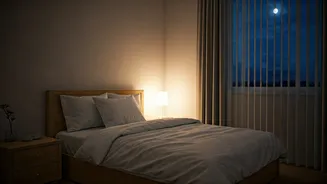Control Light Exposure
The body's natural sleep-wake cycle, known as the circadian rhythm, is greatly influenced by light. Exposure to light, especially blue light emitted from
electronic devices, can disrupt this rhythm and make it harder to fall asleep. To promote better sleep, it's crucial to regulate your light exposure, especially in the evening. This involves dimming the lights at home as the evening progresses, using warmer-toned light bulbs, and avoiding bright overhead lighting before bed. Additionally, consider using blackout curtains to block out external light sources, such as streetlights or the rising sun. Implementing these strategies helps signal to your body that it's time to wind down and prepare for sleep, leading to faster and more restful nights. Furthermore, exposure to sunlight in the morning can also help regulate your circadian rhythm and improve sleep quality.
Move More Daily
Regular physical activity plays a significant role in improving sleep quality. Engaging in exercise during the day, even a simple walk, can help regulate your body's sleep-wake cycle. The more you move throughout the day, the more likely you are to feel tired and ready for sleep at night. Regular exercise is linked to improved sleep duration, reduced sleep latency (the time it takes to fall asleep), and decreased nighttime awakenings. However, it's generally recommended to avoid intense workouts close to bedtime, as this can sometimes have the opposite effect, making it harder to fall asleep. Aim to incorporate physical activity into your daily routine, whether it's a brisk walk, a gym session, or other forms of exercise. Regular exercise not only improves sleep but also has numerous other health benefits, contributing to overall well-being. Additionally, try to incorporate short bursts of movement throughout the day.
Eat Early, Light
The timing and content of your meals can affect your ability to sleep well. Eating a large meal or heavy snacks close to bedtime can interfere with sleep. This is because your digestive system will be working hard, which can disrupt your sleep. It's advisable to finish your dinner at least a few hours before bedtime, giving your body enough time to digest the food. Opt for lighter meals and snacks in the evening, focusing on easily digestible foods. Avoid consuming caffeine and alcohol close to bedtime, as they can interfere with your sleep cycle. Caffeine is a stimulant that can make it difficult to fall asleep, while alcohol can disrupt sleep patterns, leading to fragmented and less restful sleep. Following these dietary guidelines can help regulate your sleep patterns. Furthermore, eating a balanced diet with proper nutrition is also crucial for overall health and good sleep. Focus on eating nutrient-dense foods, which may help improve your sleep quality.
Limit Screen Time
Excessive screen time before bed has become a common culprit in disrupting sleep. The blue light emitted from smartphones, tablets, and computers suppresses the production of melatonin, the hormone that regulates sleep. This makes it harder for your body to recognize that it's time to sleep. It is recommended to create a tech-free buffer zone before bedtime. This may mean putting away your devices at least an hour or two before you go to sleep. Activities like reading a book, taking a warm bath, or practicing relaxation techniques can help prepare your body for sleep. Replacing screen time with relaxing alternatives can significantly improve your sleep quality. This can improve your overall health. Consider using blue light filters on your devices or adjusting your screen settings to a warmer color temperature in the evening. This can reduce the impact of blue light and promote better sleep.













